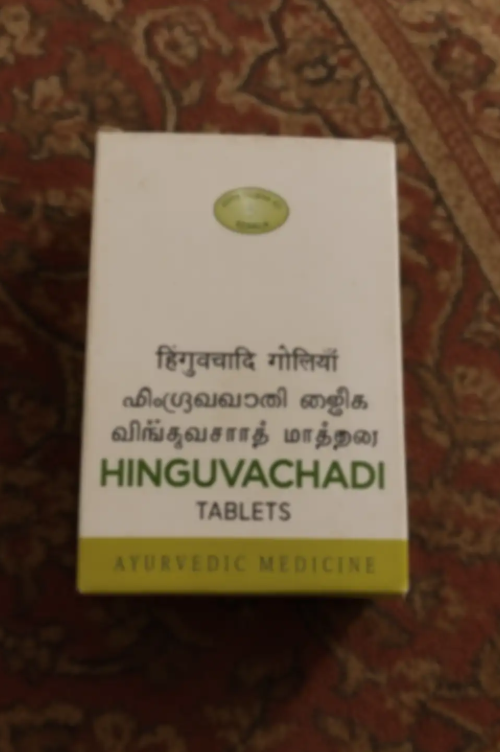Key Benefits of AVN Hinguvachadi Tablets
- Promotes healthy digestion and eases indigestion
- Reduces bloating and abdominal discomfort
- Helps relieve flatulence and excess gas
- Supports appetite in cases of mild anorexia
- May soothe heartburn and acidity naturally
- Assists normal bowel movements, both diarrhea & constipation
- Traditionally used for respiratory and nervous support too
Product Description of AVN Hinguvachadi Tablets
AVN Hinguvachadi Tablets are a time-honored Ayurvedic formula, blending a rich array of botanicals that work together in harmony. If you’ve ever felt that uneasy fullness after meals or a nagging heartburn, these little tablets might bring you some relief. They’re crafted to coax your digestive fire back into a balanced rhythm, while also calming spasms and gas. It’s a grandma-style remedy, but made in a modern GMP-certified facility – so you get tradition with quality control.
Each tablet carries the pungent aroma of asafoetida, the earthy warmth of long pepper and ginger, and the subtle tang of pomegranate extracts. They sit quietly in your pocket until you need them, ready to help with occasional bloating or those twitchy tummy moments. Some folks also find it helpful for minor cough or chest discomfort, though the star is really gut health. Take two twice a day, or as your Ayurvedic practitioner suggests, always after meals.
Notice how the flavor can be — a bit strong at first, you know? Don’t worry, that’s the herbs doing their job. And yes, it’s okay if you gasp at the smell once; we all do that. Store them in a cool, dry place away from direct sunlight. With a two-year shelf life, they’re a pantry staple waiting for the next movie night’s snack overload or that impromptu spicy dinner.
Key ingredients with descriptions of AVN Hinguvachadi Tablets
- Shuddha Hingu (Asafoetida): A resin used traditionally to support digestion.
- Vacha (Acorus calamus): Aromatic herb, valued in Ayurveda for its warming qualities.
- Vijaya (Terminalia chebula): Known as a gentle tonic in classical texts.
- Pashugandha (Cleome gynandra / Cleome viscosa): Leafy herb with a distinctive aroma.
- Dadima (Punica granatum): Pomegranate seed, used as a flavoring and mild astringent.
- Dipyaka (Trachyspermum ammi): Carom seed, commonly used for its carminative effects.
- Dhanyaka (Coriandrum sativum): Coriander seed, often used in spice blends.
- Patha (Cyclea peltata): Climbing plant, noted in Ayurveda for its bitter taste.
- Pushkara (Inula racemosa): Flowering root, traditionally used in respiratory support preparations.
- Shati (Hedychium spicatum): Ginger lily rhizome, prized for its aromatic essence.
- Hapusha / Mundi (Sphaeranthus indicus): Known as East Indian globe thistle.
- Agni (Plumbago zeylanica): Root extract, mentioned as a digestive stimulant.
- Yavakshara (Hordeum vulgare): Barley alkaline salts.
- Svarjikakshara: Traditional alkaline compound.
- Saindhava lavana: Rock salt, common mineral salt.
- Sauvarchala Lavana: Unique sochal salt variety.
- Vida Lavana: Bida salt, salt from saline soils.
- Shunti (Zingiber officinale): Ginger root, widely used spice.
- Maricha (Piper nigrum): Black pepper, aromatic spice.
- Pippali (Piper longum): Long pepper fruit.
- Ajaji (Cuminum cyminum): Cumin seed, common seasoning.
- Chavya (Piper chaba): Wild pepper variety.
- Tintidika (Rhus parviflora): Berry-bearing shrub.
- Vetasamla (Garcinia morella): Fruit rind, used as souring agent.
Key uses of AVN Hinguvachadi Tablets
- Helps alleviate occasional bloating and flatulence
- Supports relief from mild indigestion and heartburn
- Assists in normalizing appetite and digestion cycles
- Used traditionally for mild abdominal cramps and spasms
- May soothe intermittent diarrhea or constipation
- Often suggested for sprue and malabsorption syndromes
- Prescribed in Ayurveda for mild cough or chest discomfort
- Applied in cases of hydrocele and intermittent spasmodic pain
- Sometimes used to support respiratory wellness in asthma
- Considered in IBS-D (irritable bowel syndrome with diarrhea)
How to use AVN Hinguvachadi Tablets
Take 2 tablets twice daily with warm water, after meals. Or follow the specific advice of your Ayurvedic practitioner. You might notice a strong flavor at first—totally normal! Avoid exceeding recommended dosage unless directed by a professional.
Safety information about AVN Hinguvachadi Tablets
- Children: Use only under pediatric guidance. Lower doses may be advised.
- Pregnant women: Avoid use, as safety data during pregnancy is limited.
- Breastfeeding mothers: Consult your healthcare provider before starting.
- People with chronic diseases: Seek medical advice; may interact with certain conditions.
- People with allergies: Check ingredients; avoid if sensitive to any listed herb or salt.
- Elderly individuals: Generally well-tolerated but start with a lower dose.
- Patients taking medications: Could interact with blood thinners or antacids, consult doctor.
- People with weakened immunity: Use under supervision, as individual response may vary.
Additional information about AVN Hinguvachadi Tablets
Each bottle contains 120 tablets, manufactured according to Good Manufacturing Practices. Store in a cool, dry place, away from direct sunlight. Best before two years from the date of manufacture. Keep out of reach of children. For any queries, reach out to AVN Ayurvedic customer support. Not evaluated by FDA. Not intended to diagnose, treat, cure or prevent any disease.
